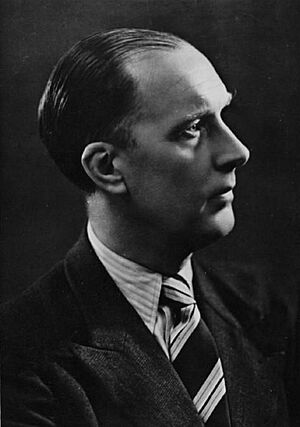Claude Delvincourt facts for kids
Claude Étienne Edmond Marie Pierre Delvincourt (born January 12, 1888, died April 5, 1954) was a talented French musician. He was a skilled pianist and a composer of classical music. He wrote many different kinds of pieces, from orchestral works to music for films.
Contents
Life and Music
Delvincourt was born in Paris, France. His parents were Pierre Delvincourt and Marguerite Fourès.
Becoming a Musician
Claude Delvincourt studied at the Conservatoire de Paris, a famous music school. He learned from great teachers like Léon Boëllmann and Henri Büsser. He also studied counterpoint (how different melodies fit together) and fugue (a type of musical composition) with Georges Caussade. His composition teacher was Charles-Marie Widor.
He won the Prix de Rome twice, in 1911 and 1913. The Prix de Rome was a special award for young French artists. In 1913, he shared the award with another famous composer, Lili Boulanger.
Leading Music Schools
Delvincourt became the Director of the Conservatoire in Versailles in 1932. Later, in 1940, he became the Director of the Paris Conservatoire. This was a very important job in French music.
Helping Students During Wartime
During the German occupation of France in World War II, Delvincourt faced difficult times. He had to follow strict rules from the Vichy government. These rules unfairly excluded some professors and students, especially Jewish people.
However, Delvincourt did his best to protect his students. With help from Marie-Louise Boëllmann, he stopped many young musicians from being forced into a forced labor program. He created the Orchestre des Cadets du Conservatoire (Cadet Orchestra of the Conservatoire). He convinced the German authorities that these students were doing their duty by playing music.
Delvincourt also secretly joined a group called the Front National des Musiciens. He tried to hide students who were in danger and never asked for their papers. Because of his brave actions, he saved many students. The Gestapo, the German secret police, even threatened him. He had to go into hiding until the war ended.
Later Life
Claude Delvincourt remained the Director of the Conservatoire until his death. He died on April 5, 1954, after a car accident in Italy. The famous organist Marcel Dupré took over his role as director.
Main Musical Works
Claude Delvincourt wrote many different types of music.
Orchestral Works
These are pieces for a large group of instruments, like a symphony orchestra.
- Serenade or Radio-Serenade (1914)
- Typhaon, a symphonic poem (1914)
- L'offrande à Siva, a dance piece (1921)
- Boccacerie, based on "The Decameron" (1924)
- Croquembouches, for piano and orchestra (1926)
- Bal vénitien, a suite (1927)
- Choreographic Prelude (1931)
- Ce Monde de rosée (1934)
- Film d'Asie, based on the documentary "La Croisière Jaune" (1937)
- Pamir, a suite (1938)
- Piano Concerto, unfinished (1954)
Chamber Music
These are pieces for a small group of instruments.
- Quintet for piano and string quartet (1907)
- Trio for piano, violin, and cello (1909)
- Sonata for violin and piano (1922)
- Croquembouches for saxophone and piano (1929)
- Danceries, five pieces for violin and piano (1930)
- Contemplation for violin and piano (1935)
- String Quartet (posthumous) (1954)
Works for Solo Instruments
These are pieces for one instrument, like a piano or organ.
- Five Pieces for piano (1923)
- Boccacerie, five portraits for piano (1926)
- Croquembouches, twelve pieces for piano (1926)
- Bal vénitien, for two pianos (1927)
- Heures juvéniles, twelve pieces for piano (1928)
- Images pour les contes du temps passé, for four-hand piano (1935)
- Three Pieces for organ (1937)
Vocal and Choral Works
These are pieces for voices, sometimes with instruments or orchestra.
- Thestylis, for soprano and orchestra (1908)
- Hodie Christus natus, for choir (1909)
- Aurore, choir for female voices (1910)
- Acis et Galathée, a cantata (1910)
- Nuit tombante, for mixed choir (1911)
- Yanitza, a cantata (1911)
- La Source, choir for female voices (1912)
- Fulvia, a cantata (1912)
- Berceuse, for voice and piano (1912)
- Faust and Helena, a cantata (1913)
- Five Melodies for voice and piano (1914)
- Ave Verum Tota Pulchra Es, a motet (1920)
- Ce Monde de rosée, fourteen songs (1925)
- Onchets, five melodies (1929)
- Chansons de la ville et des champs, six popular songs (1933)
- Four Songs by Clément Marot, for soprano and piano (1935)
- Pater Noster, for voice and organ (1937)
- Melody for voice and piano (1942)
- Salut solennel en sol, for choir and orchestra (1948)
Incidental Music
This is music written for plays or stage performances.
- La femme à barde, a farce (1936)
- Automne, with choirs (1937)
- Œdipus-rex, with choirs (1939)
- Lucifer ou Le Mystère de Caïn, a mystery play (1940)
Film and Documentary Music
Delvincourt also composed music for movies.
- La Croisière jaune, a documentary (1934)
- The Call of Silence, a film (1936)
- Sisters in Arms, a film (1937)
- Brazza ou l'épopée du Congo, a film (1940)


